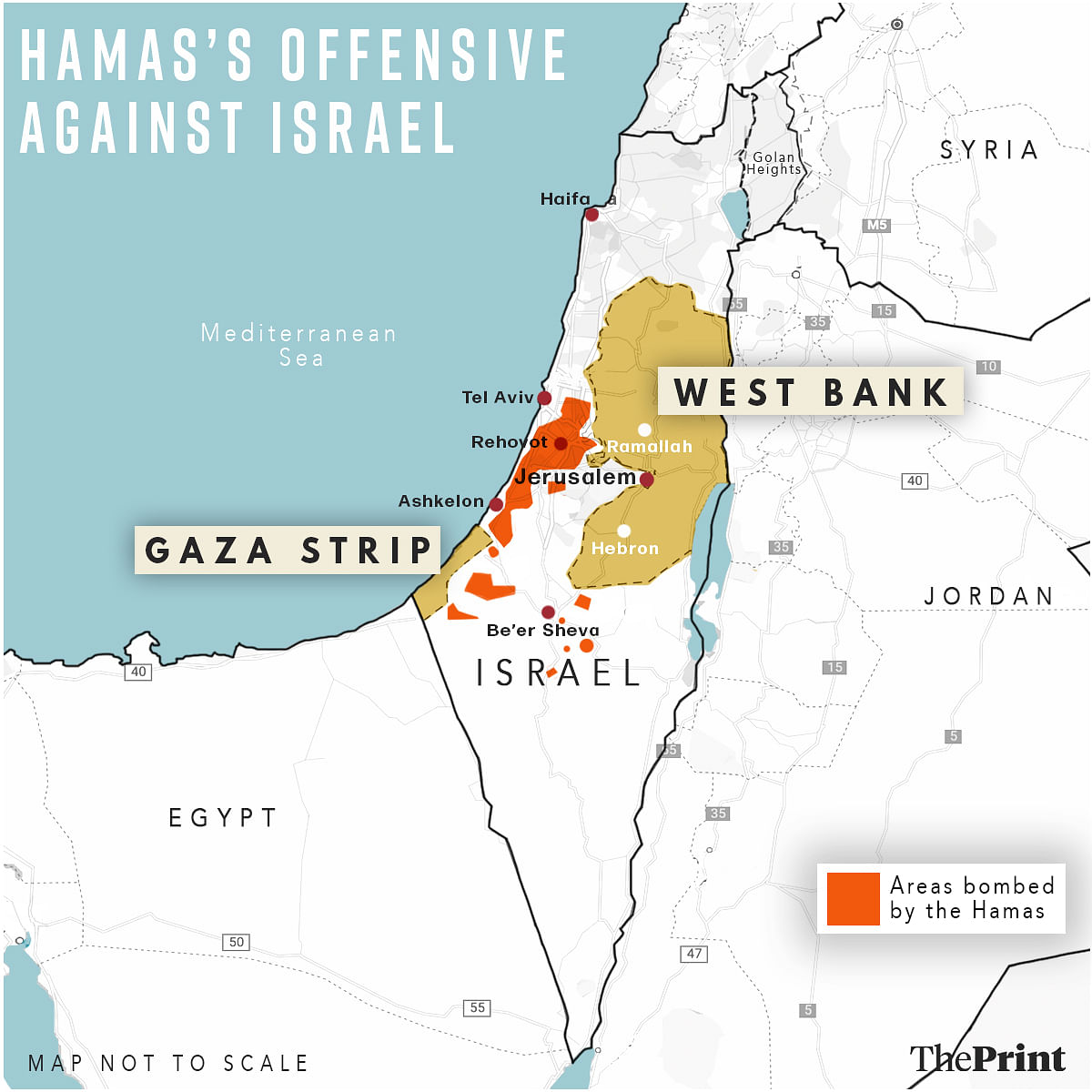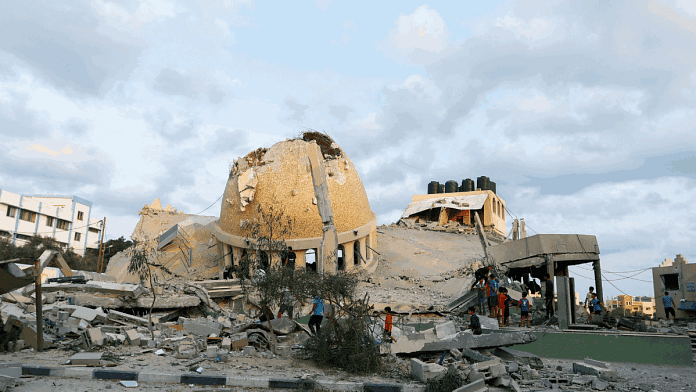New Delhi: Israel is fighting a two-front war as it battles Hamas — the Palestinian militant group in control of the Gaza Strip — in the south, and the Lebanese militant group Hezbollah in the north.
On Sunday, Hezbollah fired several rockets and artillery shells at three Israeli posts in the disputed Shebaa Farms area, saying “it was in solidarity with Hamas”. Israel responded by shelling a Hezbollah post in Har Dov in the same area. Shebaa Farms is a 39-square-km territory that Israel captured from Syria in the 1967 Six-Day War, but Lebanon and Syria both claim it as Lebanese land.
The attack by Hezbollah came less than 24 hours after Hamas launched a surprise two-front attack on Israel Saturday morning, killing at least 600 Israelis and wounding 1,900, according to figures released by Israeli officials. Prime Minister Benjamin Netanyahu, meanwhile, vowed to destroy the militant group’s operations and “turn them into rubble”.
He spoke about a “long and difficult war” with an “unbearable price” and accused Hamas of ‘waging a brutal and evil war and murdering innocent Israelis’. Netanyahu also warned the residents of Gaza to vacate their homes before Israel launches its counter-offensive.

Israeli forces have said that they are “prepared for all scenarios, and would continue to protect the security of the residents of the State of Israel”.
More than 313 Palestinians, including 20 children have been killed and nearly 2,000 injured as a result of Israeli airstrikes in Gaza, according to the Palestinian Authority’s health ministry. The death toll includes seven Palestinians, including a child, who Palestinian officials said died in the West Bank during an operation by Israeli forces.
Many world leaders have condemned the coordinated aerial and ground attack by Hamas. These include leaders of G7 countries, such as the US, UK, France.
On Sunday, Prime Minister Narendra Modi in a post on X expressed his solidarity with Israel and denounced the Hamas offensive as a “terrorist attack”. Members of BRICS, meanwhile, called for de-escalation and acceptance of the two-state solution.
Also Read: Israel-Gaza crisis holds brutal lessons in how not to fight terrorism & insurgencies
‘Swords of Iron’ counter-offensive
As part of its counter-offensive, called Operation ‘Swords of Iron’, the Israel Defence Forces (IDF) struck numerous launch sites, operation rooms inside mosques, aerial weapons production sites and Hamas’s intelligence headquarters, Sunday.
They claimed to have killed more than ‘400 terrorists’.
🔴Since 12 am yesterday, in response to the brutal terrorist offensive against Israel launched by Hamas, the IDF carried out the following operational activities in Gaza: 1/4
— Israel Defense Forces (@IDF) October 8, 2023
Israeli forces continue to fight Hamas incursions at eight locations, reported the Associated Press.
The IDF has also reportedly set up a “situation room” to gather information on Israeli citizens they suspect were taken hostage by Hamas. Head of the IDF Personnel Directorate, Maj. Gen. Yaniv Asor appointed Lior Carmeli, a general in reserves, to lead this team.
Reports also surfaced saying that Israeli forces have regained control of Sderot police station in southern Israel, which was overrun by Hamas gunmen Saturday.
Meanwhile, The Times of Israel, an Israeli news portal, reported that Netanyahu is in talks with Opposition leader Yair Lapid and National Unity party leader Benny Gantz to form an emergency unity government to deal with the security challenges.
And in Alexandria, Egypt, two Israeli tourists and an Egyptian national were killed after a local police officer fired at an Israeli tour group, reported The Guardian, adding that the officer was immediately arrested.
Egypt and Israel signed a peace treaty in 1979, roughly six years after the Yom Kippur war where a coalition of Arab states led by Egypt and Syria joined forces and launched a two-front offensive on Israel. The roughly 20-day-long war ended with a cease-fire agreement, brokered by the US and the Soviet Union.
Palestinian right to defend
The Palestinian National Authority (PA), which controls the West Bank region, has called for an emergency meeting of the Arab League — an intergovernmental body consisting of 22 member states including Egypt, Lebanon, Iraq, Saudi Arabia, and Jordan, among others.
According to the Palestinian news agency WAFA, President Mahmoud Abbas directed officials to “protect the Palestinian people, stressing the right of the Palestinian people to defend themselves against the terrorism of settlers and the occupation forces”.
He also urged the international community to intervene and compel the ‘Israeli occupation authorities to fulfill their legal obligations towards the Palestinian people’.
(Edited by Richa Mishra)
Also Read: How Al-Aqsa mosque, 3rd holiest site in Islam, became focal point of Israeli-Palestinian tensions



